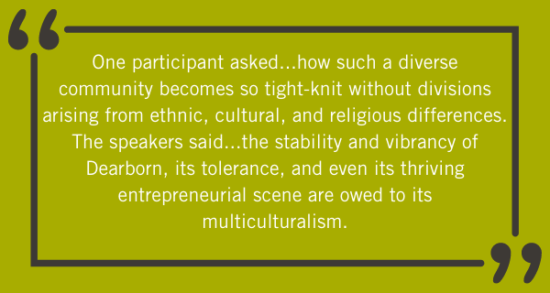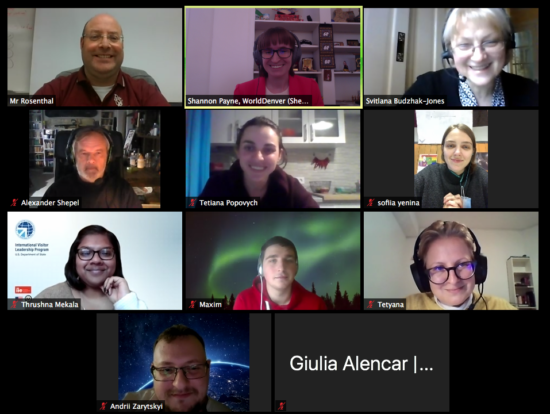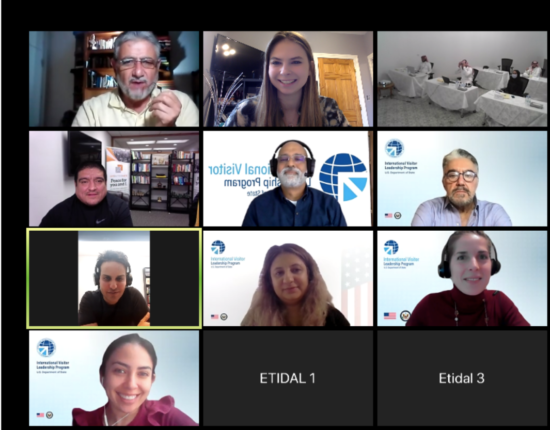In October 2020, Community-Based Members around the country welcomed visitors from Lebanon, Saudi Arabia, and Ukraine for IVLP projects on various topics in civil rights, inclusion, and social justice. Learn more about the IVLP groups and the local professional resources they met with during their virtual trips around the United States.
FOUNDATIONS AND CHALLENGES OF CIVIL RIGHTS IN THE UNITED STATES (LEBANON)
NPA: IIE
GLOBAL TIES ALABAMA
Since one of the objectives was ‘to examine the relationship between law enforcement, the U. S. Criminal Justice System and minority communities,’ the Equal Justice Initiative (EJI) was [our] primary resource for the project. EJI uses a legal team to advocate for youth and adults marginalized in the criminal justice system. Based in Montgomery, Alabama, EJI was founded by Bryan Stevenson, author of the book Just Mercy and a national and global leader in criminal justice reform. The film “Just Mercy” based on Stevenson’s book has been translated into other languages and IVLP participants sometimes have the opportunity to view it before coming to the U.S.
EJI Senior Attorney Charlotte Morrison and Staff Attorney Ashley Adams led a very open, honest discussion with participants sharing what their organization has accomplished in changing laws, while also acknowledging hurdles to overcome in creating systemic change. As these emerging leaders from Lebanon were very aware of racial tensions in the United States, Morrison and Adams also discussed how EJI uses its Legacy Museum and National Memorial for Peace and Justice to create dialogue about racial discrimination and the legacy of slavery in the U.S. –Jacqui Shipe, CEO, Global Ties Alabama
GLOBAL TIES DETROIT

Through this virtual program, a Lebanese delegation connected with Detroit and Dearborn-based professionals working in human rights and social justice to examine how the greater-Detroit community works to promote free speech, strengthen inclusive public attitudes, and bridge gaps between law enforcement and minority communities.
Representatives of Fordson High School and Arab Community Center for Economic and Social Services (ACCESS) Community Health & Research Center led the discussion, sharing how schools and community work together to tackle human rights issues. Located in Dearborn, MI, Fordson and ACCESS are part of a multicultural community defined by diverse ethnicities, religions, languages, cuisines, and perspectives—nearby an array of Middle Eastern, Mexican, Thai, Indian, and Polish restaurants, and in between two Christian churches, sits the Islamic Center of America, the largest mosque in the United States.
Fordson and ACCESS spoke about Dearborn’s culture of inclusion and how it is crucial that voices coming from different social, ethnic, and economic backgrounds are heard and respected. One participant asked Fordson and ACCESS to explain how such a diverse community becomes so tight-knit without divisions arising from ethnic, cultural, and religious differences. The speakers said the community is cohesive because of – not despite – its diversity. The stability and vibrancy of Dearborn, its tolerance, and even its thriving entrepreneurial scene are owed to its multiculturalism. ACCESS and Fordson pointed out that in spite of challenges, the community and its leaders work together to make it a flourishing, inclusive city that celebrates different cultures and ideas. They envision their role as civic and social justice workers as crucial to building a community united in its diversity.
Global Ties Detroit is proud to facilitate these discussions and provide a platform for our community leaders to showcase their inspiring work and stories. Conversations like these ignite a spark of positive change that spreads from greater Detroit to other corners of the globe. –Melissa Wandrei, Program Officer, Global Ties Detroit
ADVOCACY FOR THE LGBTI COMMUNITY (UKRAINE)
NPA: IIE
COUNCIL FOR INTERNATIONAL VISITORS TO IOWA CITIES (CIVIC)
During their virtual visit to Iowa City, participants met with Mayor Bruce Teague, the first openly gay man of color appointed mayor in Iowa, to discuss the local government’s role in supporting the LGBTI community. The visitors commented that meeting with Mayor Teague was an honor, inspiration, and the highlight of their Iowa City programming.
Additionally, we arranged meetings with the Iowa City Human Rights Commission, the Iowa City Police Department’s LGBT Community Liaison, representatives from the University of Iowa’s Women’s Resource and Action Center, and Spectrum UI, a student group dedicated to providing a safe space to all students exploring their sexual and gender identities. The visitors were very engaged in the meetings and discussions. They indicated that their meetings with public officials, as well as representatives from a nonprofit organization and a student group, provided them with valuable insight into the various ways in which community support and advocacy for LGBTI individuals is bolstered in a relatively small, U.S. community. This program was unique in that each of the local resources were new to volunteering with CIVIC.
After the program, all of them reached out to me expressing interest in future participation. The leader of Spectrum UI, University of Iowa senior Joseph Haggarty, was particularly impressed by the group and excited about the opportunity to engage with future IVLP delegations. Mayor Teague had been unfamiliar with CIVIC prior to his meeting with this group, but afterwards he commended us on the important work we do for the community and reiterated his interest in continued participation. These responses are important to CIVIC because we rely heavily on community and university support for interns, volunteers, publicity, and fundraising. Due to the mutually beneficial outcomes of this program for the visitors, local resources, and CIVIC, I consider “Advocacy in the LGBTI Community” to have been a great success. We look forward to hosting more social and civic justice programs in the future. –Grace Bryant, Program Coordinator, CIVIC
WORLDDENVER

Ukrainian IVLP group “Advocacy for the LGBTI Community” meeting with the Honorable Paul Rosenthal (top left). Photo provided by WorldDenver.
In October 2020, WorldDenver was proud to host five Ukrainian leaders in LGBT+ advocacy on a virtual IVLP program conducted in partnership with IIE. In four meetings, over two days, the participants discussed advocacy and coalition-building strategies with their Denver counterparts. Through this collaborative program, WorldDenver connected with several new local resources, and because of due to its virtual nature, were able to bring in perspectives that would not have been present otherwise. We shared this program with our board and community members as well as our social media followers.
Their first meeting, with the Colorado Civil Rights Division and the Colorado LGBT Bar Association, covered the regulatory and legislative frameworks in Colorado to protect and advocate for the LGBT+ community. The speakers explored a case study, Masterpiece Cakeshop, Ltd. v. Colorado Civil Rights Commission, in which a Denver-area bakery refused service to a same-sex couple. The case rose to the United States Supreme Court and provided an example for the visitors of how civil rights cases travel through the U.S. judicial system.
Representation was a recurrent theme throughout the program. The group met with Addison Herron-Wheeler, the editor of Denver-based LGBT+ magazine OUT FRONT, and with Paul Rosenthal, the former co-chair of the Colorado Legislative LGBTQ Caucus and member-elect of the Regional Transportation District Board of Directors. In both of these meetings, the speakers emphasized the value of diverse individuals doing every day, non-activist work—a gay author writing an article about a new restaurant or a transgender legislator serving on a budgetary committee—as a transformative form of representation.
The group’s final meeting was with the Matthew Shepard Foundation, a nonprofit organization founded in honor of Matthew Shepard, a gay teenager who died as the victim of a tragic hate crime in 1998. As the meeting was held virtually, Matthew’s parents, Dennis and Judy Shepard, were able to join the call from Casper, Wyoming. Their story of turning a tragedy into two decades of action was a moving and inspirational note on which to close the Denver portion of this program. –Shannon Payne, Program Coordinator, IVLP, WorldDenver
RELIGIOUS DIVERSITY AND INTERFAITH DIALOGUE (SAUDI ARABIA)
NPA: Cultural Vistas
WORLD AFFAIRS COUNCIL CINCINNATI AND NORTHERN KENTUCKY
The Global Center for Combating Extremist Ideology (Etidal) in Riyadh, Saudi Arabia, is taking an increasingly proactive role in combating extremist and intolerant messages. Through an IVLP on Religious Diversity and Interfaith Dialogue, representatives from Etidal, benefitted from observing U.S. best practices in building partnerships, developing counter narratives, and preaching tolerance. Specifically, their exposure to these efforts will help develop build capacity and knowledge for Etidal and other Saudi organizations to increase their religious and educational engagement to maximize outreach to youth, religious groups, and religious leaders to reduce discrimination and persecution.
Our organization collaborated with Cultural Vistas, NPA, and one local resource, EquaSion, which hosts the Festival of Faiths. EquaSion’s Chip Harrod met virtually with a delegation from Saudi Arabia. Interested in learning more about U.S. best practices for fostering interfaith dialogue and combating religious extremism, the conversation was arranged by the World Affairs Council of Cincinnati and Northern Kentucky. The Saudi delegation was especially interested in the Cincinnati Festival of Faiths and the Cincinnati Regional Coalition Against Hate, both initiatives of EquaSion. –Michelle Harpenau, Executive Director, WAC Cincinnati and Northern Kentucky
WORLD AFFAIRS COUNCIL KENTUCKY AND SOUTHERN INDIANA
Louisville was selected as a host for this particular program on best practices to counter religious extremism due to our history of building and sustaining a Compassionate City, created in November 2011 when Mayor Greg Fischer signed a resolution committing to a multi-year Compassionate Louisville campaign – making Louisville an international Compassionate City, the largest U.S. city with this distinction. In a meeting with Mayor Fischer, the IVLP group explored how Louisville as a city practices models of compassion within its departments, and how the city empowers other sectors to partner in building a compassionate community. During this program, the gropu also met with Sabeen Nasim, the Director of the Louisville Office of Globalization, and Janice Cates, the Director of Compassion Initiatives for the Office of the Mayor. Specifically, Cates highlighted Mayor Fischer’s “Give-A-Day” Week of Volunteer service which includes more than 140,000 volunteers annually.
During a second panel discussion, we also met with Ari Cowan, the Director-General of the International Center for Compassionate Organizations (ICCO), and Jud Hendrix, the Executive Director of Interfaith Paths to Peace (IPP). ICCO focuses on fostering cultures of compassion in government, business, healthcare systems, service agencies, colleges and universities, schools, faith groups, and other organizations worldwide. During our meeting, Cowan discussed his evidence-based, public-health-centered approach to research on violence response and prevention through the Violence Integrative Prevention and Restoration (PAR) Model. IPP is a grassroots community peace organization, established in 1996. For over two decades, IPP has promoted interfaith and intercultural understanding through inclusive programming, including celebrating diverse cultures, ethnicities, faiths, traditions, and nationalities through education, peace-making, and collaboration. IPP discussed some of their most important community events and their impact in the local community.
Ultimately, WAC Kentucky hopes that through the dialogue between international visitors and Louisville community members, and our mutual exchange of ideas, our shared conversations will translate into future action so that similar initiatives can be implemented internationally.
This was one of my first-ever virtual IVLP programs, and it will remain one of my most memorable. I am so grateful for the accessibility of our resources in Louisville and the insightful questions that visitors asked. Though we met in a virtual setting, I think our community and global connections remain stronger than ever. –Andi Dahmer, Exchange Program Manager, WAC Kentucky and Southern Indiana
WORLDCHICAGO

Religious views and beliefs are diverse and complicated. We respect and show deference to the varied religious identities throughout the world, but when religious beliefs manifest themselves as violence and fear tactics that start wars, promote terrorism, and radicalize the youth, we become less rooted in pluralism and common ground.
At WorldChicago, we know how to combat intolerance and fanaticism; and that is through sharing and conversation that is central to citizen diplomacy. As we welcomed the IVLP delegation, we set a virtual table for a global conversation of diverse voices and opinions about how to counter radical ideologies through programs at all levels of government, and local organizations.
Our visitors were able to meet with the Chicago nonprofit, Life After Hate, which is committed to helping people leave the violent far-right and instead to connect with humanity and lead compassionate lives.
The discussion, led by Sammy Rangel, Life After Hate’s Executive Director and a former member of the American violent far-right extremist movement, helped to foster a nuanced discussion about what draws people to extremist groups, and, equally important, why they leave. This included talks about today’s technology, especially social media, which can serve as an amplifier to hate speech and bait the younger generation down a dangerous path.
“We believe that helping individuals turn their backs on hate groups enhances the overall health of the nation, which is why we go to great lengths to standardize our approach,” says Rangel.
Though this conversation was personal and difficult at times, we were all able to explore our commonalities and leave our Zoom room fortified with the idea that social cohesion and community resilience would help us combat hate with love, and understanding. –Morgan Lyn, Marketing & Development Manger, WorldChicago
